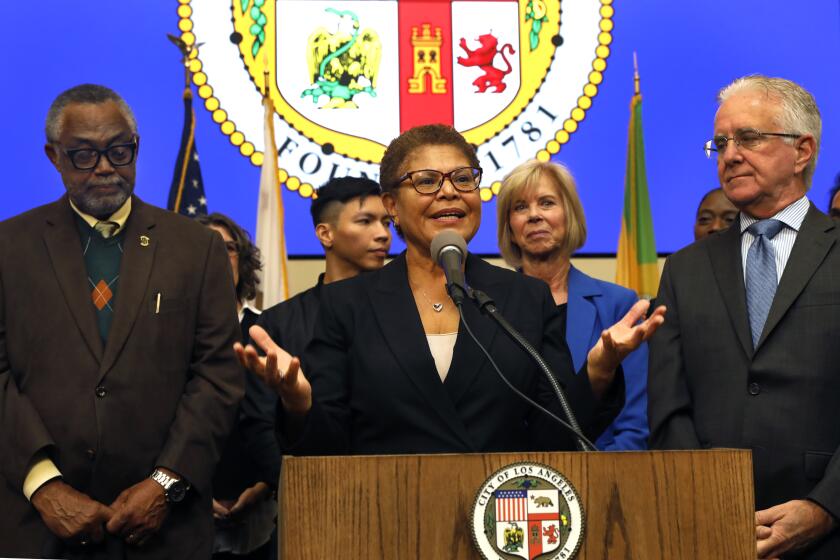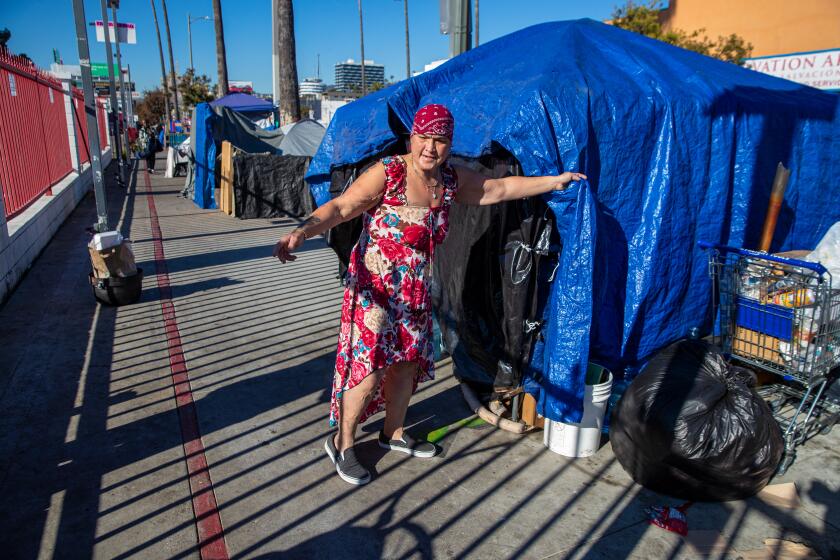Editorial: Yes, it really will take billions of dollars a year to solve homelessness in California

- Share via
Gov. Gavin Newsom has said that addressing homelessness is his top priority. It should be. California has 30% of the country’s homeless population and 50% of those who sleep outside as opposed to in shelters or temporary housing.
Certainly no California governor has responded to the humanitarian crisis the way Newsom has. He has invested in programs to prevent and reduce homelessness like no governor before him. His Homekey program to buy and convert hotels, motels and apartment buildings into housing for homeless people has been a smart way to add affordable housing faster than building from the ground up.
Newsom’s budget proposal for the 2023-24 fiscal year contains $3.4 billion in homelessness funding. Because of the slowing economy, the state has a projected $22.5-billion deficit and Newsom, for the first time since he became governor, is having to cut spending. But the administration said no homelessness funding programs have been cut for the upcoming fiscal year. The question is whether $3.4 billion is enough to turn the corner on homelessness.
Weeks into her tenure as Los Angeles mayor, Karen Bass talks about her focus on homelessness and affordable housing.
Several nonprofit organizations that work on issues of housing and homelessness say it’s not.
The Corporation for Supportive Housing put out a report last month estimating that the state needed to invest $8.1 billion a year over 12 years to solve homelessness in California. (And “solve” is a word the group did not shy away from using.) That would cover housing, rental assistance and other services. The League of California Cities last month wrote a letter to the governor asking for “a permanent funding stream of $3 billion annually to help cities keep Californians in their homes and prevent more Californians from having to live on the street, under bridges, or in their cars.”
Of course, housing advocates and local governments want more funding — and consistent funding. Newsom wants cities and counties to be aggressive in addressing homelessness, but their officials worry the funding might be reduced or disappear the following year and they’ll be unable to pay for their expanded housing and services.
Newsom has expressed concern that homelessness has increased and encampments have proliferated even as the money invested goes up. He’s right to demand accountability from cities and counties to use this money effectively.
If Bass and her staff can keep up this pace and speed up permanent housing projects, then the city could see a transformation on the streets.
The governor’s budget proposal continues funding to address encampments ($400 million) and includes $1 billion for a fifth round of grants for homeless housing, assistance and prevention — but he wants the grants contingent upon local governments committing to more aggressive goals. Local officials take that to mean significantly reducing the number of homeless people.
However, just as cities and counties need to be held accountable, the state needs to understand the reality of this colossal problem that has been decades in the making and cannot be solved in a few budget cycles. When Newsom took office in 2019, the budget for homelessness was a mere $500 million. And for years, the state let it slide when some cities and counties didn’t build enough housing for their populations.
As a result, there is not enough affordable housing for low-income people, who can fall into homelessness, particularly if they have other problems such as mental illness or substance abuse. There is not enough permanent housing for homeless individuals. And there are not enough mental health, drug treatment or other services that can help keep vulnerable people stably housed.
Solving homelessness is one of California’s most difficult challenges, but it is essential to the health and well-being of the entire state. That means not just housing people languishing on sidewalks, but creating housing — especially affordable housing — at a pace not seen in decades. We believe that Newsom sees this for the urgent issue it is. But he should make sure that his budget this year and in future years reflects that urgency.
More to Read
A cure for the common opinion
Get thought-provoking perspectives with our weekly newsletter.
You may occasionally receive promotional content from the Los Angeles Times.












